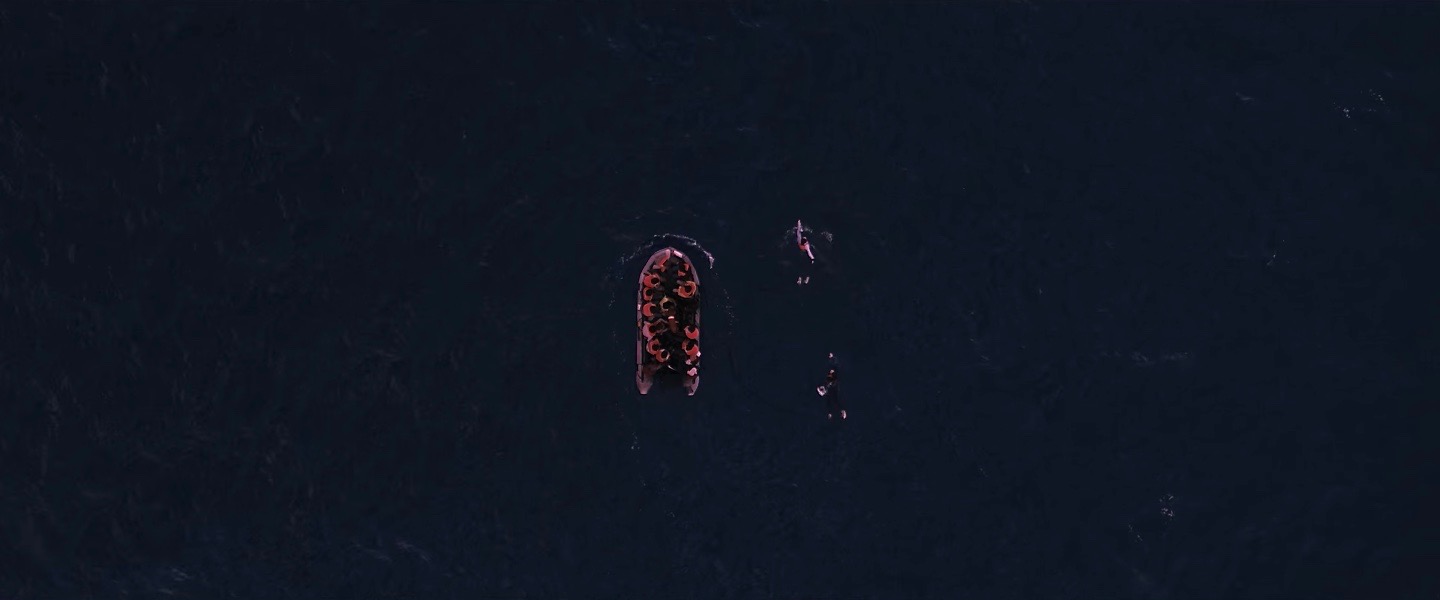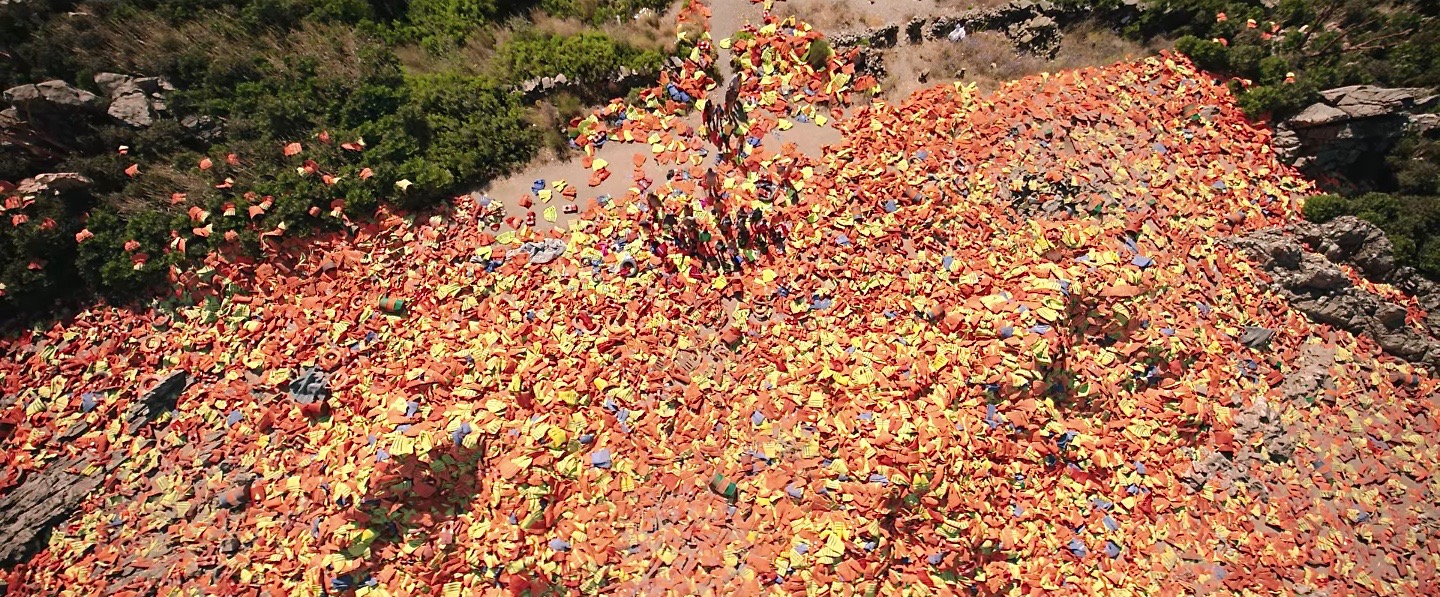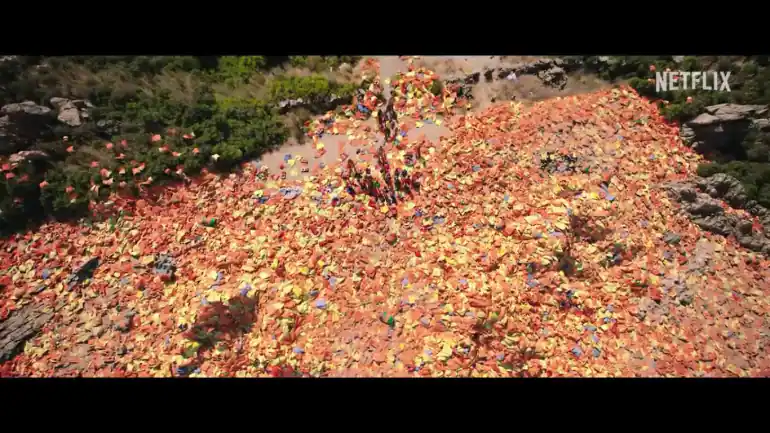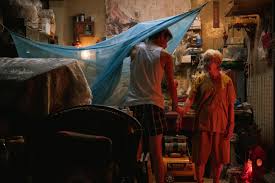

“One death is a tragedy. A million deaths is a statistic.” This infamous statement by Stalin summarizes why we need to watch movies like The Swimmers.
103 million. Are you able to comprehend just how large this number is? Are you able to imagine it, really imagine it? Can you picture that there are currently 103 million people worldwide who have been forcibly displaced from their home and have had to leave behind everything they’ve ever known. No. It’s a fact that our brains are not built to process such large numbers, which gives one explanation as to why we cannot grasp the magnitude of the statistics that flash across news outlets. The Swimmers is a movie based on the true story of two sisters Yusra and Sara Mardini, who flee their war-torn home in Syria in order to try and find a better life. The viewers get an intimate depiction of the girls’ travel and it feels like we’re a bystander peering into their life, a life and journey that most of us probably do not relate to, experiencing all the emotions with them. We need to watch movies like The Swimmers for this very reason: 103 million is incomprehensible for us, but 2 is not. And for the few hours that the movie runs for, you can’t help but be reminded of the reality that their story echoes one of a number we cannot fathom.
The movie begins in pre-war Damascus, where we see Yusra and Sara try to live their lives as normal teenagers in spite of the looming Syrian revolution. They go swimming, dance at clubs, laugh with their parents and younger sister, and eat at restaurants with their friends. Of course, Yusra and Sara worry too. How could they not? Each day they see new bombings on the news and hear about people they know fleeing to different countries using all sorts of methods. Their bond as sisters is evident from the get-go; those with siblings know the mixed bag of emotions that comes with this relationship. The undeniable love, pride, joy, concern, and annoyance. Two sisters, Nathalie and Manal Issa were cast to play Yusra and Sara respectively, and perhaps that’s why the relationship we see on screen is so akin to that of real life.
Yusra and Sara are swimmers. They have both been training with their father, a former swimmer himself. Yusra has dreams to swim in the Olympics. Sara, on the other hand, has lost interest in swimming as a result of what is happening in their country. The turning point for the Mardini family occurs when the swimming center where Yusra has a competition is bombed. They all survive the bombing, but now it is more evident than ever that their lives are at risk. And so their father reluctantly begins the preparation for Yusra, Sara, and their cousin Nizar to emigrate to Germany.
The three arrive in Turkey in hopes of getting to Greece via the sea and then ultimately to Germany. In Turkey, while they’re waiting for the boat, they meet some other refugees also on their way to Greece. The movie’s director Sally El Hosaini has mentioned in interviews that it was important for her to make people understand that refugees are ordinary people, something she executes brilliantly in this scene. Their personalities shine through and we’re shown the different reasons why an individual might make this journey. Escaping an abusive husband, for example, is seen in the character of Shada and her baby. In this group planning to cross the sea to Greece, some of the actors were real Syrian refugees that had taken the journey. I think that’s incredible. It speaks to the authenticity of the movie as it gives a space for real people to play a part in telling their own story.
The cinematography throughout the entire movie is commendable, but in my opinion the most noteworthy display of it is the voyage from Turkey to Greece. 18 people and a baby squeeze into a dinghy that clearly cannot hold the weight of everyone. A journey that was supposed to take 45 minutes ends up taking 3 and a ½ hours because the motor breaks down 15 minutes into the trip. The choppy filming and close-up footage of people’s faces reflects the overwhelming panic. When water floods into the boat as a result of the weight, everyone starts throwing all the non essentials into the sea to lighten the load. There’s a profound shot here, where Yusra throws her medals, medals that were supposed to tell people in Germany that she swam for Syria. Your heart sinks as you see the medals, synonymous to Yusra’s dreams, slowly melt into the dark sea and ultimately drop out of view. There’s a larger message to this scene: you can earn just about anything back. But a life that’s gone is gone. Sara jumps into the sea to help pull the dinghy. Seeing her, Yusra does the same. They both swim in the freezing water and push the boat for hours until they finally reach Greece. There’s a birds eye view shot that starts with Yusra, Sara, and the other refugees throwing their life jackets into an existing pile on the coast of Greece, and it keeps panning out and out. I remember holding my breath and willing with my eyes for it to be over. I wanted to pause the movie or look away, but I didn’t. As I’m writing this, I’m aware of what a privileged position I’m in, to have the ability to just ‘make it stop’ with a click of my remote or a turn of my head. It’s an influential scene, because it visually demonstrates that they were not the first to make and survive this harrowing trip. And more importantly, they will not be the last.
The movie touches on the general ignorance of the human population. In Greece, Yusra and Sara sneak into a beach club and look out onto numerous people laying around on floaties and being pulled by jet skis on the same sea that they were fighting for their lives in just a mere day ago. Sara notes “they have no idea people are dying in that sea.” The rest of the journey from Greece to Germany made me starkly aware of just how much I didn’t know about forced displacement. The conditions that especially female migrants go through, the amount of individuals that prey on the vulnerability and desperateness of refugees by promising to get them to a safe spot in exchange for money, and the authorities who wash their hands clean from dealing with migrants because it’s not their problem.
In Germany, Yusra and Sara must stay in a refugee center until they are granted asylum. Yusra cannot wait to start swimming, and finds a local swimming club where she meets a German coach named Sven. She persuades him to give her a chance, and impressed by her ability he accepts to train her and also helps in getting her and Sara accommodation outside of the refugee center. People like Sven give us faith in humanity, and show us the power of being kind. With the Rio Olympics approaching, the first Refugee Olympic Team has been formed. Sven wants Yusra to be a part of this team, but she replies with “If you had the chance, would you want to compete because you were good enough or because people felt sorry for you? I want to go to the Olympics more than anything. But when I go, I will be there swimming for my country.” I think this highlights a struggle that a lot of refugees have; the fear of being impartially treated due to their circumstance, both against them and for them. In the moments where the bias favors them, it’s important for them to remember the times when it didn’t. Sara says it to Yusra perfectly: “This was everything you ever wanted. Not in the way you want it, but nothing has been the way we wanted it. Why would this be any different? This might be the only opportunity of your life. Don’t be stupid, take it.”
The Swimmers left me feeling that we can do better. We must do better. And if we start with empathizing and understanding the story of Yusra and Sara, then maybe we have a chance to extend the same compassion and attempt to fathom a million more stories.
Directed by: Sally El Hosaini
The Swimmers is now available on Netflix.

“One death is a tragedy. A million deaths is a statistic.” This infamous statement by Stalin summarizes why we need to watch movies like The Swimmers.
103 million. Are you able to comprehend just how large this number is? Are you able to imagine it, really imagine it? Can you picture that there are currently 103 million people worldwide who have been forcibly displaced from their home and have had to leave behind everything they’ve ever known. No. It’s a fact that our brains are not built to process such large numbers, which gives one explanation as to why we cannot grasp the magnitude of the statistics that flash across news outlets. The Swimmers is a movie based on the true story of two sisters Yusra and Sara Mardini, who flee their war-torn home in Syria in order to try and find a better life. The viewers get an intimate depiction of the girls’ travel and it feels like we’re a bystander peering into their life, a life and journey that most of us probably do not relate to, experiencing all the emotions with them. We need to watch movies like The Swimmers for this very reason: 103 million is incomprehensible for us, but 2 is not. And for the few hours that the movie runs for, you can’t help but be reminded of the reality that their story echoes one of a number we cannot fathom.
The movie begins in pre-war Damascus, where we see Yusra and Sara try to live their lives as normal teenagers in spite of the looming Syrian revolution. They go swimming, dance at clubs, laugh with their parents and younger sister, and eat at restaurants with their friends. Of course, Yusra and Sara worry too. How could they not? Each day they see new bombings on the news and hear about people they know fleeing to different countries using all sorts of methods. Their bond as sisters is evident from the get-go; those with siblings know the mixed bag of emotions that comes with this relationship. The undeniable love, pride, joy, concern, and annoyance. Two sisters, Nathalie and Manal Issa were cast to play Yusra and Sara respectively, and perhaps that’s why the relationship we see on screen is so akin to that of real life.
Yusra and Sara are swimmers. They have both been training with their father, a former swimmer himself. Yusra has dreams to swim in the Olympics. Sara, on the other hand, has lost interest in swimming as a result of what is happening in their country. The turning point for the Mardini family occurs when the swimming center where Yusra has a competition is bombed. They all survive the bombing, but now it is more evident than ever that their lives are at risk. And so their father reluctantly begins the preparation for Yusra, Sara, and their cousin Nizar to emigrate to Germany.
The three arrive in Turkey in hopes of getting to Greece via the sea and then ultimately to Germany. In Turkey, while they’re waiting for the boat, they meet some other refugees also on their way to Greece. The movie’s director Sally El Hosaini has mentioned in interviews that it was important for her to make people understand that refugees are ordinary people, something she executes brilliantly in this scene. Their personalities shine through and we’re shown the different reasons why an individual might make this journey. Escaping an abusive husband, for example, is seen in the character of Shada and her baby. In this group planning to cross the sea to Greece, some of the actors were real Syrian refugees that had taken the journey. I think that’s incredible. It speaks to the authenticity of the movie as it gives a space for real people to play a part in telling their own story.
The cinematography throughout the entire movie is commendable, but in my opinion the most noteworthy display of it is the voyage from Turkey to Greece. 18 people and a baby squeeze into a dinghy that clearly cannot hold the weight of everyone. A journey that was supposed to take 45 minutes ends up taking 3 and a ½ hours because the motor breaks down 15 minutes into the trip. The choppy filming and close-up footage of people’s faces reflects the overwhelming panic. When water floods into the boat as a result of the weight, everyone starts throwing all the non essentials into the sea to lighten the load. There’s a profound shot here, where Yusra throws her medals, medals that were supposed to tell people in Germany that she swam for Syria. Your heart sinks as you see the medals, synonymous to Yusra’s dreams, slowly melt into the dark sea and ultimately drop out of view. There’s a larger message to this scene: you can earn just about anything back. But a life that’s gone is gone. Sara jumps into the sea to help pull the dinghy. Seeing her, Yusra does the same. They both swim in the freezing water and push the boat for hours until they finally reach Greece. There’s a birds eye view shot that starts with Yusra, Sara, and the other refugees throwing their life jackets into an existing pile on the coast of Greece, and it keeps panning out and out. I remember holding my breath and willing with my eyes for it to be over. I wanted to pause the movie or look away, but I didn’t. As I’m writing this, I’m aware of what a privileged position I’m in, to have the ability to just ‘make it stop’ with a click of my remote or a turn of my head. It’s an influential scene, because it visually demonstrates that they were not the first to make and survive this harrowing trip. And more importantly, they will not be the last.
The movie touches on the general ignorance of the human population. In Greece, Yusra and Sara sneak into a beach club and look out onto numerous people laying around on floaties and being pulled by jet skis on the same sea that they were fighting for their lives in just a mere day ago. Sara notes “they have no idea people are dying in that sea.” The rest of the journey from Greece to Germany made me starkly aware of just how much I didn’t know about forced displacement. The conditions that especially female migrants go through, the amount of individuals that prey on the vulnerability and desperateness of refugees by promising to get them to a safe spot in exchange for money, and the authorities who wash their hands clean from dealing with migrants because it’s not their problem.
In Germany, Yusra and Sara must stay in a refugee center until they are granted asylum. Yusra cannot wait to start swimming, and finds a local swimming club where she meets a German coach named Sven. She persuades him to give her a chance, and impressed by her ability he accepts to train her and also helps in getting her and Sara accommodation outside of the refugee center. People like Sven give us faith in humanity, and show us the power of being kind. With the Rio Olympics approaching, the first Refugee Olympic Team has been formed. Sven wants Yusra to be a part of this team, but she replies with “If you had the chance, would you want to compete because you were good enough or because people felt sorry for you? I want to go to the Olympics more than anything. But when I go, I will be there swimming for my country.” I think this highlights a struggle that a lot of refugees have; the fear of being impartially treated due to their circumstance, both against them and for them. In the moments where the bias favors them, it’s important for them to remember the times when it didn’t. Sara says it to Yusra perfectly: “This was everything you ever wanted. Not in the way you want it, but nothing has been the way we wanted it. Why would this be any different? This might be the only opportunity of your life. Don’t be stupid, take it.”
The Swimmers left me feeling that we can do better. We must do better. And if we start with empathizing and understanding the story of Yusra and Sara, then maybe we have a chance to extend the same compassion and attempt to fathom a million more stories.
Directed by: Sally El Hosaini
The Swimmers is now available on Netflix.



